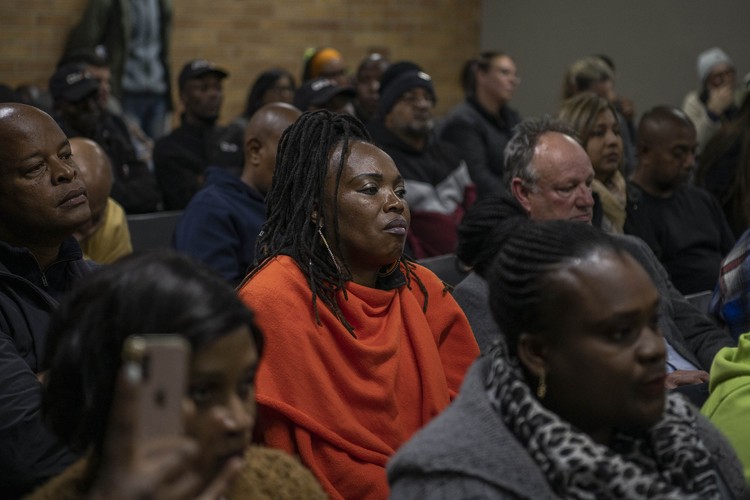Legal setback for PRASA whistleblower
Fired head of legal Martha Ngoye’s reinstatement overturned on appeal
PRASA has won an appeal against a previous Labour Court ruling which ordered the reinstatement of “whistleblower” Martha Ngoye and two other executives. Archive photo: Ihsaan Haffejee
- PRASA whistleblower Martha Ngoye’s reinstatement has been overturned by the Labour Court of Appeal
- The court said while the termination of her contract and those of two other executives was unlawful, the order of reinstatement should not have been made by the Labour Court.
- The court said the judge ought to have used his discretion, and reinstatement could lead to conflict in the workplace.
The Passenger Rail Agency of South Africa (PRASA) has won an appeal against a previous Labour Court ruling which ordered the reinstatement of “whistleblower” Martha Ngoye and two other executives.
The Labour Appeal Court has ruled that while PRASA terminated the contracts of head of legal Ngoye, chief operating officer Nkosinathi Khena, and general manager for strategy Tiro Holele unlawfully and without good or proper cause, the court ought not to have ordered their reinstatement with back pay.
The court said the axed employees had relied on the provisions of the Basic Conditions of Employment Act (BCEA) in the litigation, and not the Labour Relations Act (LRA).
The appeal court therefore overturned the Labour Court ruling in favour of PRASA.
It is believed Ngoye and others might now approach the Constitutional Court.
Ngoye, Khena and Holele were dismissed in early 2021.
The stated reason for the terminations was that their five-year contracts had expired. In a press release, PRASA accused them of “capitalising on the instability of the board, which culminated in their extended lawful stay”.
The three challenged the decision in the Labour Court, which ruled in their favour, and ordered their reinstatement with back pay.
However, PRASA appealed this ruling in the Labour Appeal Court which handed down judgment this week.
Judge President Basheer Waglay (with two judges concurring) said the relief the axed employees sought in the lower court was expressly “specific performance” (re-instatement and back pay) in terms of the Basic Conditions of Employment Act.
He said they had denied that their contracts were for fixed five-year terms but were for permanent employment and “rather curiously” PRASA had failed to challenge any of these facts and allegations “but had only seen fit to raise technical defences”.
“The Labour Court correctly found no merits in the points PRASA raised and found the termination was unlawful and granted the relief they sought,” Judge Waglay said.
“In the absence of any challenge to the facts and allegations set out and made by the respondents [the employees], the court must accept them as correct. It is clear that PRASA did in fact terminate the contracts without good or proper cause.
“The grounds for the termination are without merit and there can be no dispute that the termination was unlawful,” he said.
But since the employees had disavowed any reliance on the Labour Relations Act, the only relief to which they would be entitled was specific performance, or damages.
They had not proven any damages so they were not entitled to that.
With regards to specific performance, Judge Waglay said a court had to look at the circumstances of the breach and determine what was appropriate “that is to compel the parties to continue the relationship even though one of the parties, on the face of it, no longer wanted to continue with the contract”.
This was opposite to the relief a dismissed employee was entitled to who sought reinstatement in terms of the Labour Relations Act for unfair termination.
He said for specific performance the court had to exercise judicial discretion which was “fraught with difficulties”, because employment contracts were not commercial transactions but personal contracts.
“In my view when we are dealing with employees on the upper echelons of a business enterprise, one must not lose sight of the fact that these employees on the level of management need to involve themselves in helping with the running of the enterprise,” he said, noting there needed to be co-operation.
He said he was not satisfied that their reinstatement would not lead to conflict in the workplace. Added to this was the fact that the termination demonstrated that PRASA no longer needed their services.
Seeking specific performance because of financial prejudice at the risk of losing their income, was not a ground for granting the relief.
“The Labour Court clearly failed to exercise its discretion. The relief granted was misconceived and the application should have been dismissed,” Judge Waglay said.
It has been widely reported that Ngoye was a whistleblower who assisted PRASA to win court victories in matters where the rail agency had made several unlawful and corrupt payments. She also testified at the State Capture Commission.
Next: Putin the “Hitler of the 21st Century” says former Ukrainian president
Previous: Court tells Lottery legal manager to pay punitive costs
© 2024 GroundUp. This article is licensed under a Creative Commons Attribution-NoDerivatives 4.0 International License.
You may republish this article, so long as you credit the authors and GroundUp, and do not change the text. Please include a link back to the original article.
We put an invisible pixel in the article so that we can count traffic to republishers. All analytics tools are solely on our servers. We do not give our logs to any third party. Logs are deleted after two weeks. We do not use any IP address identifying information except to count regional traffic. We are solely interested in counting hits, not tracking users. If you republish, please do not delete the invisible pixel.



